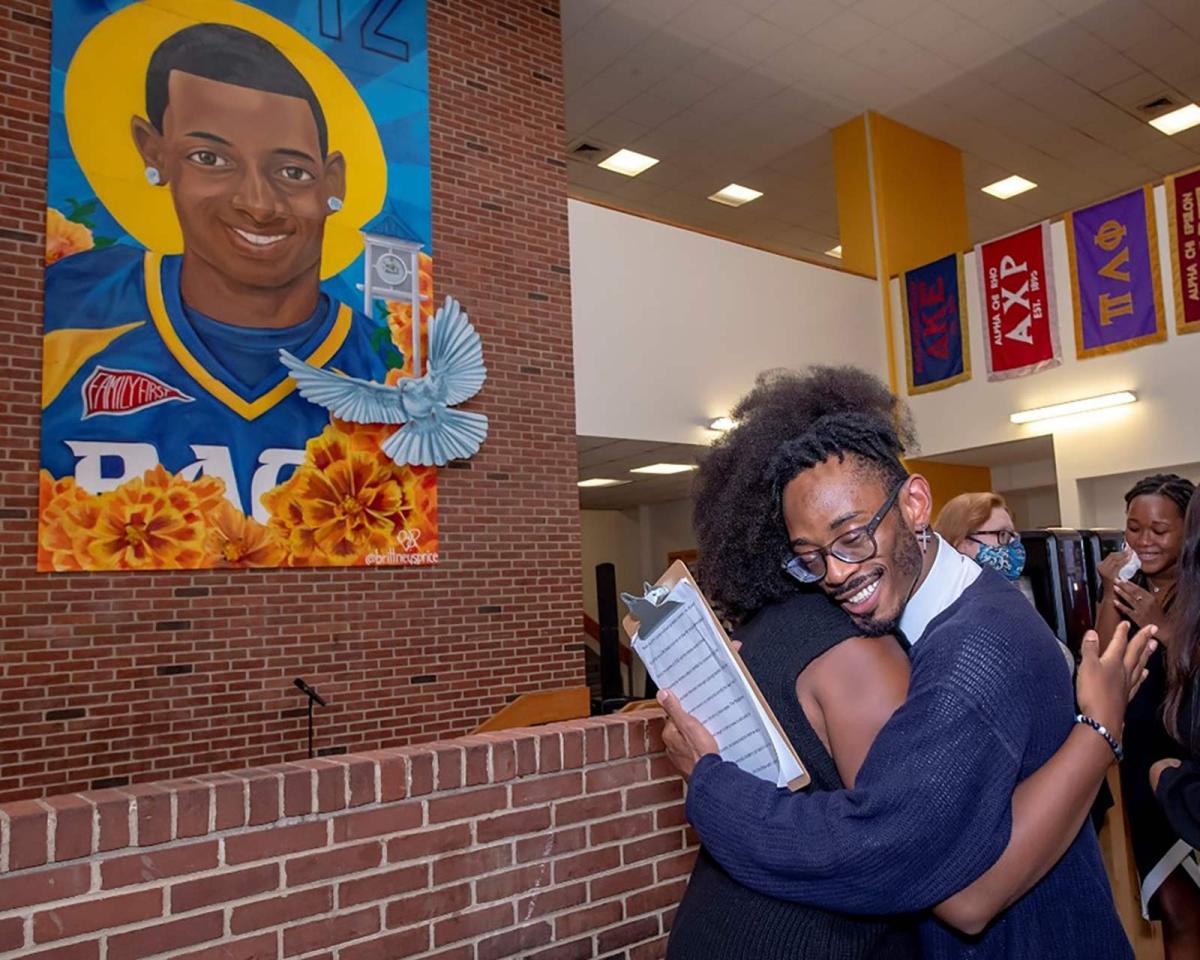
Pace University to Kick-Off Social Justice Week on October 24
Pace University on Monday, October 24 will kick-off Social Justice Week across its three campuses – in lower Manhattan, Pleasantville and White Plains – featuring events that adhere to values of equity and justice while engaging the campus community in learning activities and dialogue centered on the issues of social justice.
In its third year, Social Justice Week runs from October 24 through October 29 and serves as a way of honoring the life of Danroy “DJ” Henry, a Pace student and member of the football team who was shot and killed by a police officer on October 10, 2010. Social Justice Week is held to coincide with DJ’s birthday (October 29) and explores the connections between his story and much broader themes of social injustice in this country.
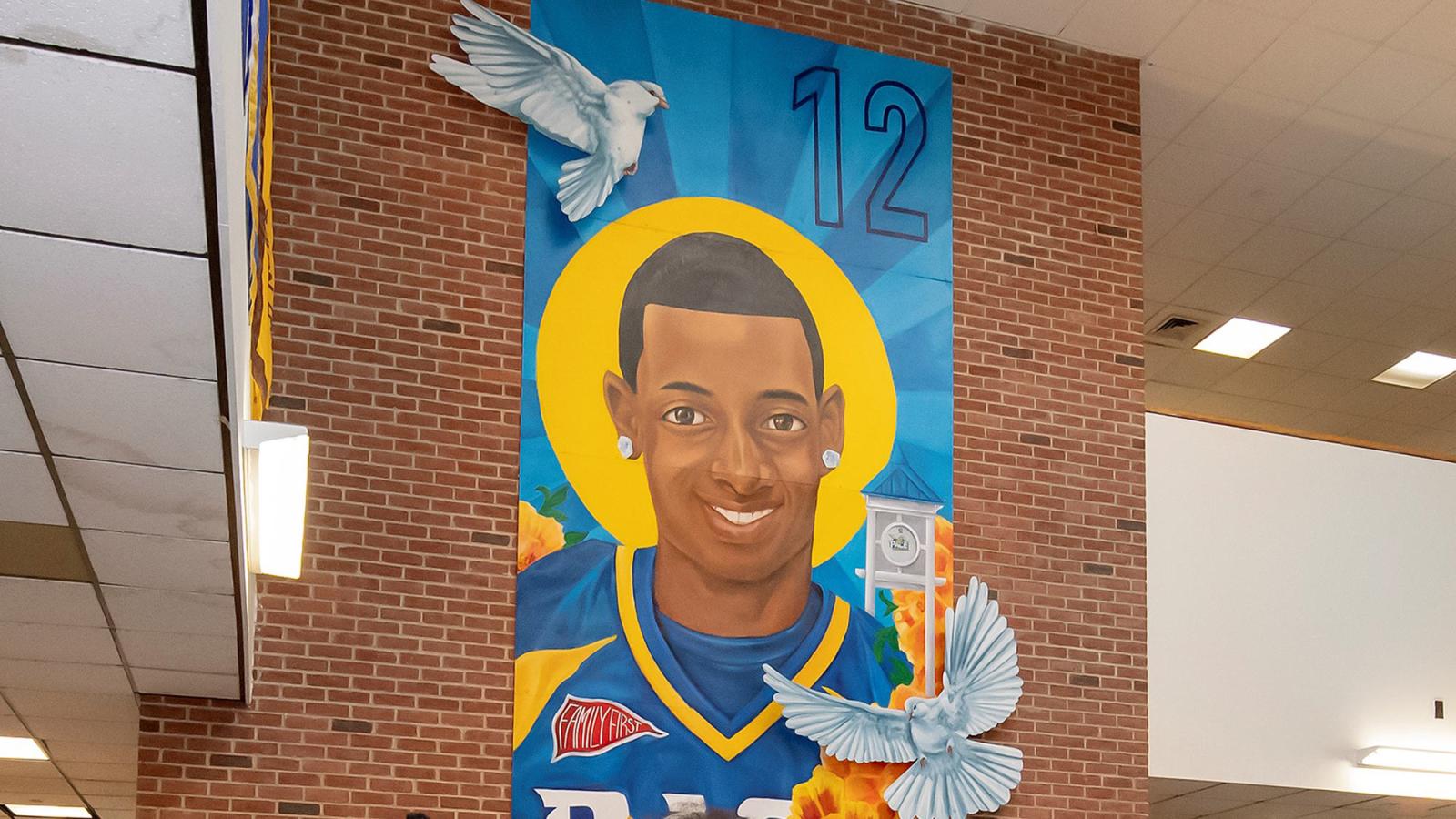
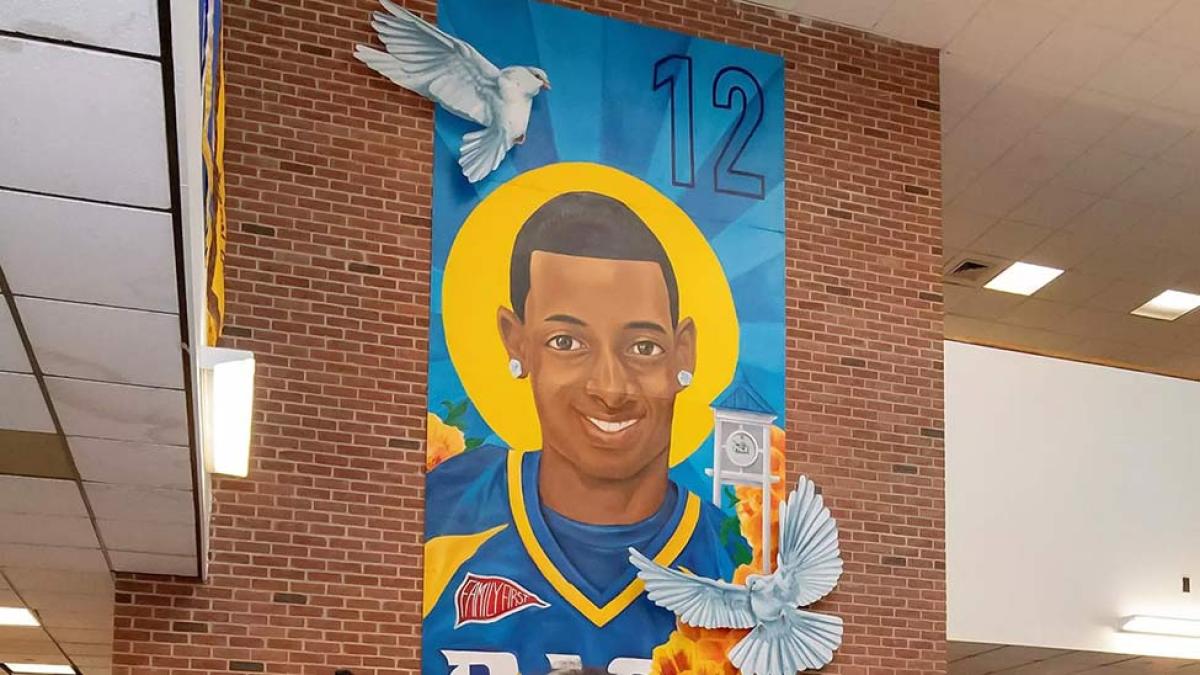
In its third year, SJW commemorates the memory of Danroy “DJ” Henry
Pace University on Monday, October 24 will kick-off Social Justice Week across its three campuses – in lower Manhattan, Pleasantville and White Plains – featuring events that adhere to values of equity and justice while engaging the campus community in learning activities and dialogue centered on the issues of social justice.
In its third year, Social Justice Week runs from October 24 through October 29 and serves as a way of honoring the life of Danroy “DJ” Henry, a Pace student and member of the football team who was shot and killed by a police officer on October 10, 2010. Social Justice Week is held to coincide with DJ’s birthday (October 29) and explores the connections between his story and much broader themes of social injustice in this country.

“At Pace University, we’re committed to honoring the memory of DJ Henry and to the ongoing work of social and racial justice,” said Pace President Marvin Krislov. “Social Justice Week each year provides an opportunity for our community to explore issues of injustice, social change, and anti-racism. It enables us to introduce new generations of students to DJ and his story, and it allows the Pace community to foster dialogue and take action.”
The week will kick off with a candlelight vigil in New York City hosted by the Black Student Union. It will continue with a fundraiser for the DJ Henry Dream Fund at The Elisabeth Haub School of Law and culminate on Saturday, October 29 with a ceremony retiring DJ’s football jersey at Pace’s football stadium.
Throughout the week, there will also be original programming of more than 35 events focusing on a broad range of topics, such as social justice in sports; a fundraiser for victims of Hurricane Fiona; a discussion of housing stability and tenant protections with New York State Senator Brian Kavanagh; a slavery and resistance walking tour; a film screening of “The True Cost,” a film about the social and environmental costs of fast fashion; a discussion on combating food insecurity; and a presentation on the history of mental health and self-care within the Black community. A full schedule of events is available.
“Social Justice Week is a part of Pace University’s commitment to working towards being an anti-racist institution,” said Todd Smith-Bergollo, senior associate dean for students. “Social Justice Week helps foster education and advocacy for our students, faculty and staff, and the greater community and we are grateful to all those whose hard work makes this week possible and to all who are participating in the programs offered.”
About Pace University
Since 1906, Pace University has educated thinking professionals by providing high quality education for the professions on a firm base of liberal learning amid the advantages of the New York metropolitan area. A private university, Pace has campuses in New York City and Westchester County, New York, enrolling nearly 13,000 students in bachelor’s, master’s, and doctoral programs in its Dyson College of Arts and Sciences, Lubin School of Business, College of Health Professions, School of Education, School of Law, and Seidenberg School of Computer Science and Information Systems.
Pace U's Lubin School of Business Launched New Entrepreneurship Studio
Pace University’s Lubin School of Business, in collaboration with AnD Ventures, recently launched the Pace Entrepreneurship Studio (PES) with an opening reception. PES will position the University as a leading institution for cultivating entrepreneurship and innovation in the tri-state area.
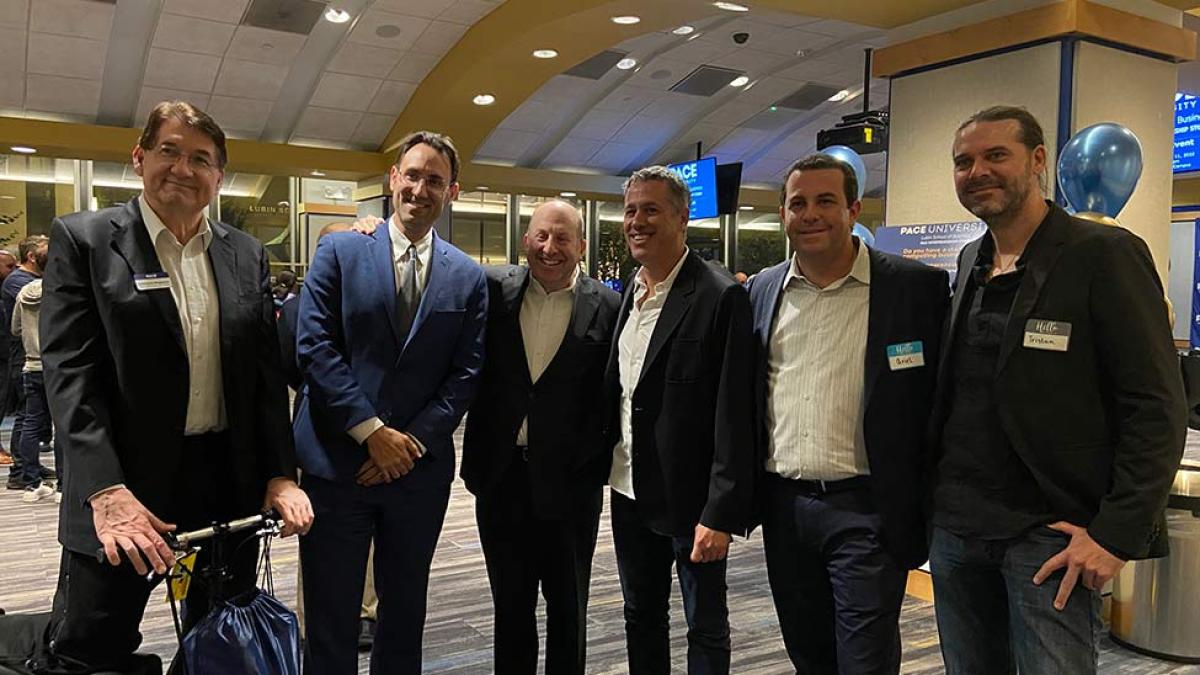
Trump's company faces criminal tax trial as his legal woes mount
The fact that the Trump Organization kept making off-the-books payments for so many years could help prosecutors show it intended to violate tax laws, a key element of proving its guilt to the jury, said Bridget Crawford, a law professor at Pace University in New York focusing on income tax and corporations. "Failure to report once might be a mistake. Failure to report over a period of time is fraud," Crawford added. "If you know of your tax obligations - which all experienced and savvy people do - and consciously disregard them, that is intent to defraud the government."
Taylor Mangus ’23 Featured on Panel at United Nations
On Wednesday, October 19, Taylor Mangus ’23, Political Science, was featured on a panel on “Disarmament Education as a Solution to Peace.”
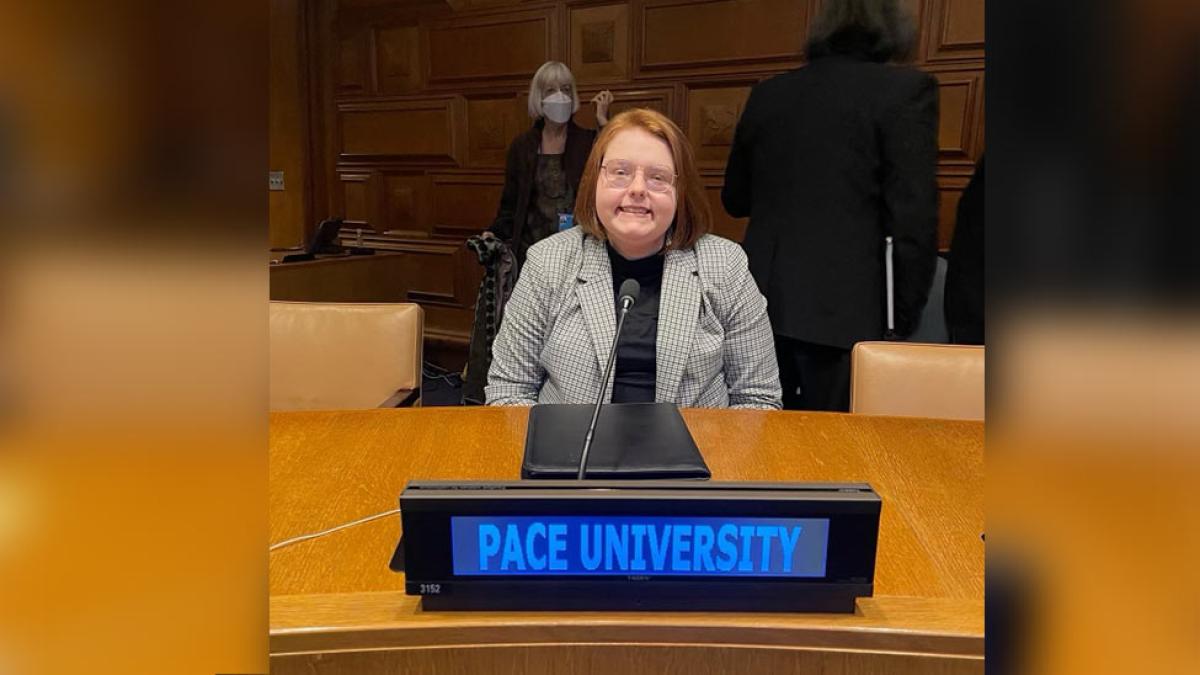
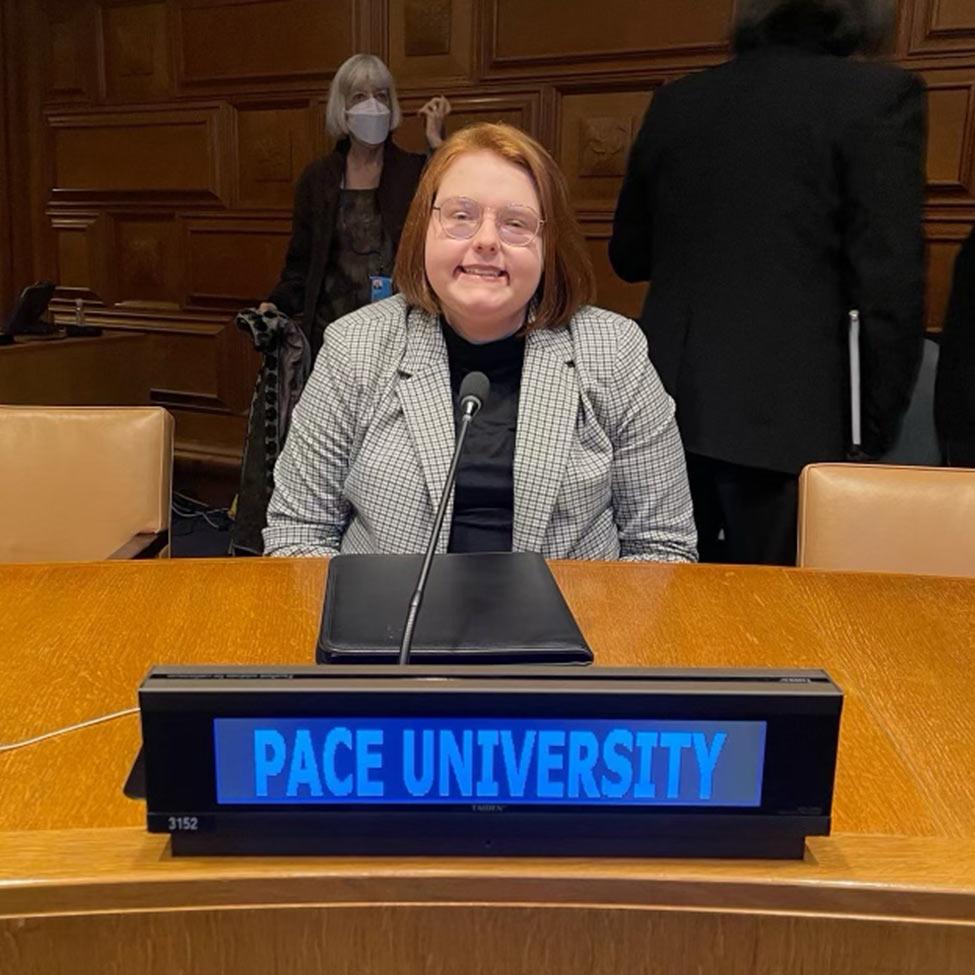
On Wednesday, October 19, Taylor Mangus ’23, Political Science, was featured on a panel on “Disarmament Education as a Solution to Peace” at the United Nations as part of the #Leaders4Tomorrow event. Mangus—who was joined on the panel by leaders such as Chair of the UN General Assembly First Committee Ambassador Mohan Pieris of Sri Lanka and Ambassador Thomas Goebel of Germany—spoke about taking courses on disarmament at Pace and interning with the Costa Rican ambassador.
Last fall, Mangus was instrumental in preparing a statement that her classmate Jeremiah Williams ’23, delivered to the United Nations General Assembly First Committee as part of a course taught by Professor of Political Science Matthew Bolton, PhD. This year, Molly Rosaaen ’22, Political Science, presented a statement prepared by five of her peers in Bolton’s class, just a week before Mangus spoke on the panel. Bolton joined Mangus at this year’s event, and 20 students from his class on disarmament attended as part of a class trip.
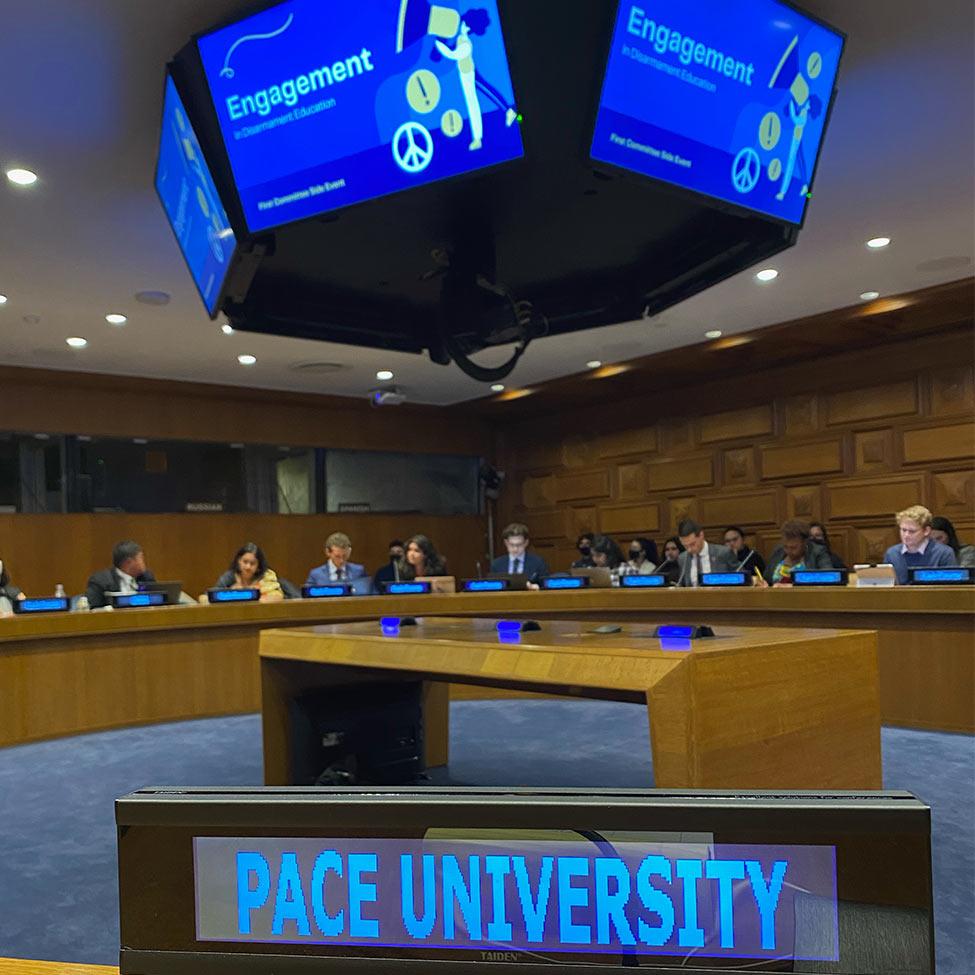
Pace University’s Lubin School of Business Launched New Entrepreneurship Studio
Pace University’s Lubin School of Business, in collaboration with AnD Ventures, recently launched the Pace Entrepreneurship Studio (PES) with an opening reception. PES will position the University as a leading institution for cultivating entrepreneurship and innovation in the tri-state area.
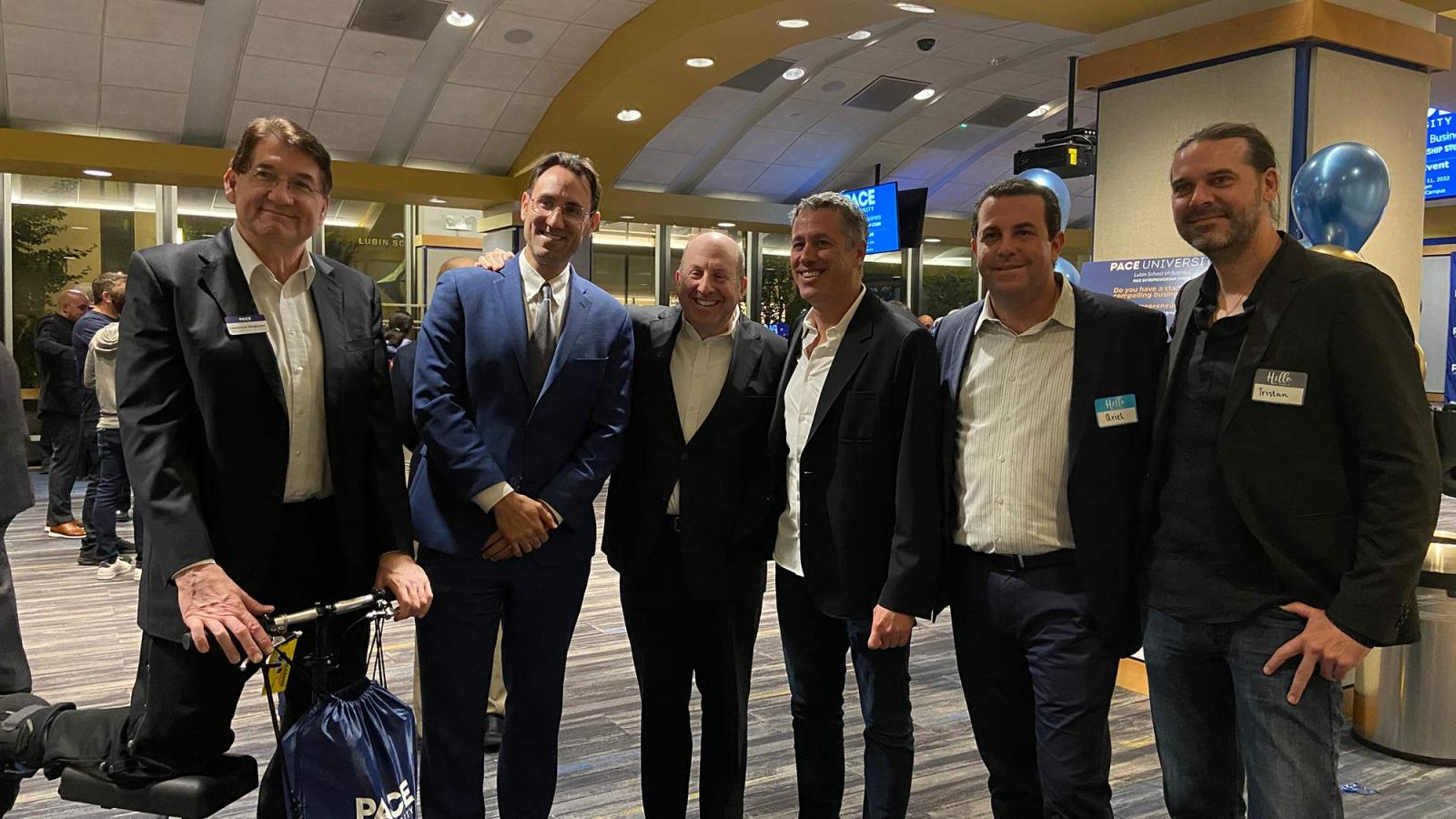
The Studio is designed to support Pace students, faculty, alumni, and staff in taking their compelling business ideas from concept to company.
Pace University’s Lubin School of Business, in collaboration with AnD Ventures, recently launched the Pace Entrepreneurship Studio (PES) with an opening reception. PES will position the University as a leading institution for cultivating entrepreneurship and innovation in the tri-state area.
“The Pace Entrepreneurship Studio represents a bold step into the future for our Lubin School of Business,” said Pace University President Marvin Krislov. “This program will give Pace students the know-how, mentorship, resources, and capability to learn how to evaluate transformative ideas and turn them into disruptive products and powerful new startups. We are grateful to our friends from AnD Ventures for their partnership in launching this exciting endeavor, and we’re excited to see what our remarkable students can produce.”
The Studio offers students, faculty, and alumni new opportunities as they take their first steps in the entrepreneurial ecosystem by providing workshops, professional sessions, training, a customized roadmap, open workspace, mentorship, and access to resources and funding. The focus is on providing entrepreneurs with the tools they will need to build successful companies. Just 48-hours after the launch, PES had already received six applications from students.
“This is a unique opportunity that we are sharing with the Pace community to support their success and the development of extraordinary products and services. Pace remains committed to facilitating great partnerships for our students, alumni, faculty, and staff” said Lawrence G. Singleton, dean of the Lubin School of Business.
At the launch event, Pace students, faculty, staff, and stakeholders were joined by distinguished guests, including a member of Pace’s Board of Trustees. An array of entrepreneurs at Pace are looking forward to meeting with the AnD Ventures team to discuss their companies and plans for growth.
“We are excited to build our presence in New York City and support Pace in building a leading entrepreneurship program aimed at actually building companies, not just educating students and alumni on how to build them,” said Roy Geva Glasberg, co-founder and managing partner of AnD Ventures. “AnD Studio is a venture builder and we are excited about developing venture capital-driven programming at the university.”
Pace University, in its true go-getter fashion, continues to cultivate entrepreneurship, entrepreneurial thinking, and innovation among members of its school-based community and the regional and local communities surrounding it. Pace “Go-Getters” with startups or compelling business ideas have been encouraged to apply to the PES program.
About the Entrepreneurship Studio at Pace University
Located at Pace University, the Pace Entrepreneurship Studio (PES) elevates promising entrepreneurs with the assistance of international leaders and professionals. PES supports new startups, from ideation to funding—from conception to operation, with the mission to teach the "how" and to support the "what"—providing students, faculty, and alumni with a complete blueprint for establishing successful businesses.
About the Lubin School of Business at Pace University
Globally recognized and prestigiously accredited, the Lubin School of Business integrates New York City’s business world into the experienced-based education of its students at Pace’s suburban and downtown campuses, implemented by one of the region’s largest co-op programs, team-based learning, and customized career guidance. Its programs are designed to launch success-oriented graduates toward upwardly mobile careers.
About Pace University
Pace University has a proud history of preparing its diverse student body for a lifetime of professional success because of its unique programs that combine immersive academics and real-world experiences. Pace is ranked the #1 private, four-year college in the nation for upward economic mobility by Harvard University’s Opportunity Insights, evidence of the transformative education the University provides.
About AnD Ventures
AnD Ventures is an Israeli venture capital firm that invests in pioneering early-stage startups and builds them into companies that make a difference. The team consists of founders, sophisticated investors, corporates, and VCs. Together, they work in concert with experts from Fortune 500 companies, serial entrepreneurs, innovators, and experts across a vast array of industries and experiences.
DEC awards grants for projects in Hudson River Estuary watershed communities
Pace University will receive $37,085 for a community-based program for the Fishkill Creek watershed in Dutchess and Putnam counties to foster the development of targeted policy, planning, and regulatory tools for natural resource and open space protection, watershed planning and shoreline resiliency.
14 Foods To Eat For Fresh Breath
According to WebMD, a study done at Pace University found that green tea extracts impeded different types of bacteria from growing. Amongst those tested in this study included the kind that causes tooth decay. This alone makes green tea a potential bad breath fighter, since oral health problems and bad breath can go hand in hand. The research also concluded that adding green tea to products like toothpaste could create a one-two punch when it comes to bacteria and viruses.
Pace U Receives Grant from The Edmond de Rothschild Foundation
Pace University’s Bachelor of Arts in Writing for Diversity and Equity in Theater and Media Arts, housed in the Dyson College of Arts and Sciences, has received a two-year, $609,000 grant from The Edmond de Rothschild Foundation that continues its support of the program.
Summer's drought has altered timing of fall foliage in the Hudson Valley
"Some trees are going to have these very bright colors but very short time compared to normal because of the drought, whereas other trees are going to cut the leaf off earlier before it even changes colors. You're really going to get this dried out brown," says Matthew Aiello, of Pace University's Environmental Studies and Sciences.